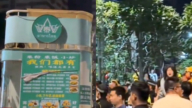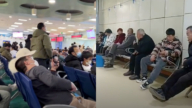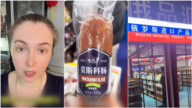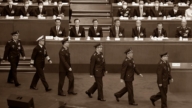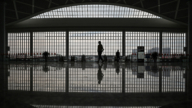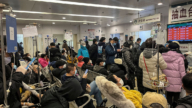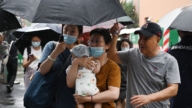【新唐人2011年9月26日讯】大陆媒体近期报导,“四大国有商业银行”九月份头半个月和8月底相比,少了4200亿元存款。有专家指出,这笔钱可能流入了民间借贷市场。而有迹象显示,民间高利借贷市场已经是“房地产泡沫后的泡沫”,一旦爆破,后果不堪设想。
大陆媒体9月22号报导,中国“工行”、“农行”、“中行”和“建行”四大国有商业银行,9月份头半个月存款数额与8月底存款比较,减少了4200亿元人民币。有学者认为,中国居民存款余额是33万亿,4200亿元存款只是这个总额的1.5%左右,数目不是很大。
但,美国“南卡罗莱纳大学艾肯商学院”教授谢田博士指出,这4200亿可能注入了民间借贷市场。这种“高利贷”如果吸引国有银行卷入,则无法计算资金总数。
谢田:“我觉得有可能进入了民间借贷市场,现在这个民间借贷市场非常疯狂。利息达到现在月息三分到六分到一毛五。一毛五就不得了了,你想那个月息啊,年利率就得180%,就是高利贷了,超高利贷了。你想180%,借100块钱,要还280多块钱。”
9月22号,《新唐人》报导的《浙江信泰集团董事长欠高利贷落跑》新闻,指出,浙江眼镜行业的龙头“信泰集团”董事长胡福林欠债潜逃美国,据内部高管透露,胡福林欠款高达20多亿,其中银行贷款8亿、民间高利贷12亿,每个月,光利息近3千万元。
而从年初到9月,中国温州有超过20家企业倒闭,老板因拖欠高利贷“跑路”,而且,这股风潮正波及杭州、宁波、台州、衢州等地。
据报导,“人民银行温州中心支行”去年底的一次民间借贷问卷调查显示,有89% 的家庭个人和59.67% 的企业参与了民间借贷。
《和讯网》博客作者童大焕的文章《谁搅动了民间高利贷浑水》写道,《中国经营报》记者在调查中发现,不管是从银行流出的资金,还是民间自有的资本,借助小额信贷或担保公司,以高利贷方式流出时,进入到实业领域的并不是很多,所谓的“高利贷危局”,只是银行、国有企业等高利贷链条上的资金拥有者,炒作的另一个专案而已。
《南方周末》评论员李铁,在博文:《中国高利贷的唯一受益者是谁? 》说,民间高利借贷,中小企业当然是受害者,消费者也在分摊着高昂的经济运行成本;而高风险所带来的不稳定性,也时刻威胁着借贷者的生存。 “当地政府部门、司法部门、银行的公职人员也涉及其中。这或许是金融垄断下的必然结果,在整个高利贷的链条中,这些金融权贵,或许是唯一真正得利的一环。”
谢田教授指出,“高利贷”对借贷的中小企业来说不仅是一杯毒酒,一旦金融泡沫崩溃,将带来社会动荡。
谢田:“但要是卷进的钱的越多的话,泡沫滚得越大,这就非常非常危险。这会把中国金融给摧毁掉。越滚越大的时候,后面的钱跟不上,不能归还前面借的钱的话,(整个体系)一下子就会垮掉。出现债务危机,很多人跳楼自杀的。这个问题会马上涉及股市和房市的,都是要命的事情,知道真相的人都会害怕。”
谢田教授表示,中国的金融泡沫破灭,只是时间的问题,一旦爆破,政府也控制不了。
新唐人记者赵心知、吴惟、王明宇综合报导。
China’s Dangerous Usury-Loan Bubble
Anchor:
Recently, mainland China media reported that four major
state-owned commercial banks had 420 billion Yuan
(US$650.7 million) less on deposit in its first two weeks of
September than they did at in the end of August.
Expert pointed out that the money might have gone into
the private lending market.
There are signs that suggest that these monies were headed
for the civilian usury lending market.
Meaning, these funds were lent out at exorbitant interest rates
and may become the next bubble to pop after the real estate bubble.
The consequences of such an event could be catastrophic.
On September 22, mainland media reported that China’s four
state-owned commercial banks, Industrial and Commercial
Bank of China Limited, Agricultural Bank of China, Bank of China,
and China Construction Bank, had 420 billion Yuan
(US$650.7 million) less on deposit in its first two weeks of
September than they did at in the end of August.
Some expert believed that this 420 billion Yuan
(US$650.7 million) figure is only about 1.5 percent of
the total Chinese savings of 33 trillion Yuan (US$5.16 trillion),
and thus a relatively insignificant number.
However, Carolina Aiken, assistant professor of marketing
at the University of South indicated that this 420 billion Yuan
(US$650.7 million) may have been poured into
the private lending market.
If state-owned banks are also involved in usury,
the total money involved can not unfathomable.
Tian Xie: “I think the money in question has gone into
the private lending market, which is now totally out of control.
Monthly interest rates range from 3 percent, to 6 percent,
and all the way up to 15 percent, which is unbearably high!
Think about it, with a monthly interest of 15 percent,
the annual interest rate would be 180 percent, meaning,
for every $100 loaned, $280 would need to be paid back.
This is usury, and even super-usury!”
On September 22, NTD TV’s report, Chairman of Center
Optical Group On the Run, revealed that the chairman of
the Zhejian Province eyeglass industry, Hu Fulin,
has fled to the United States.
According to a report by an executive member of the Center
Optical Group, Hu Fulin is 2 billion Yuan (US$313 million)
in arrears on his loans, including a 800 million Yuan
(US$125 million) bank loan, and a 1.2 billion Yuan (US$187.8 million) private usury loan.
His interest payments run close to 30 million Yuan
(US$4.69 million), per month.
From January through September, more than 20 companies
closed down in Wenzhou City, China, due to owners defaulting on their usury loans and skipping town.
This trend is spreading to other cities as well, such as:
Hangzhou, Ningbo, Taizhou, and Quzhou, etc.
According to the report, A Survey on Private Lending,
conducted by the Central Branch of People’s Bank of Wenzhou,
89 percent of individuals and 59.67 percent of the companies
surveyed are involved, in some way, with private lending.
As indicated in author Tong Dahuan’s article, Who Stirred
the Civil Usury Muddy Water, a China Business reporter found
that whether it is bank funds, or private owned capital,
to grant small credit loans or to serve as a loan guarantee,
when it involves usury, very little of it goes back into the industry.
The so-called ‘usury-critical situation’ is just another case
of banks and state-owned enterprises being at the top of
the usury-loan chain.
Southern Weekend commentator, Li Tie, wrote in a blog titled,
Who’s the Only Beneficiaries of the Chinese Usury?
that small and medium enterprises are the real victims of
the private usury industry, with consumers also being forced
to share in the enterprises’ resulting high operating costs.
The instability caused by the high risk is also threatening
the survival of the borrowers.
“Local government officials, the judiciary branch, and bank
officials, are also involved in the mix, as an inevitable result of monopolized finance.
The financial elite are perhaps the only real beneficiaries
in the usury chain.”
Professor Tian Xie indicated that usury is worse than a glass of
poisoned wine to small and medium lending enterprises.
Once the financial bubble collapses,
it will surely lead to social unrest.
Tian Xie: “The more money that’s at stake, the bigger
the bubble will get; making for a very volatile situation, which could eventually destroy China’s financial markets.
As the bubble gets bigger—snowballing out of control—
the money on reserve will not be able to keep up.
Thus, the borrowed money will not be able to be paid back,
resulting in a sudden collapse of the whole system.
In such a financial crisis,
many people will surely commit suicide.
This will immediately destroy the stock market and
real estate market; and people who know the reality will be terrified."
Professor Tian Xie said that it’s only a matter of time before
China’s financial bubble bursts. And when it does, even the government won’t be able to stop it.
NTD reporters Zhao Xingru, Wu Wei and Wang Mingyu


